USA Network’s Monk returns for its eighth and final season on Friday, August 7 [9/8C] and, in support of its return, Adrian Monk himself, Tony Shalhoub, took an hour out of his busy schedule to answer questions from over twenty media bloggers. It was my honor to be a part of this particular Q&A session.
I was wondering, what’s the lasting impression you want audience members to take from watching your show and watching you?
Tony Shalhoub: That’s a great question. I think, if I had to choose one thing, I would say that I would want people to take away this idea that sometimes people’s problems or neuroses are really the things that are kind of a blessing in disguise, and even though there’s, you know, sometimes there’s pain associated with these things that sometimes in the face of adversity with obstacles to overcome, people can really kind of soar and find their higher selves and I think that’s what we’ve tried to do on the show is we’ve portrayed this character as someone who turns his liability, his liabilities into assets per his life. And that there’s – and I hope that when we get to the end – I don’t know this for sure, but I hope when we get to the end of season eight that we’ll have seen some real healing from Monk, and I believe in that. I believe that there is healing and that there is change, and that all of those things are – they are just really, really key to all of our lives.
I wondered if you had any input into the new changes of Monk because, I mean, from the ads, it seems that he’s sort of looser and more comedic, and I wondered, I mean, because you mentioned that you really wanted to do a Galaxy Quest II. I mean, do you have a preference to comedy or drama or horror, because I know you’ve done Thir13en Ghosts, and you had a big part in 1408 and such, so I’m a big fan of yours. I’m sorry.
T. Shalhoub: Thank you. No, I appreciate it. Well, I don’t really have a preference, to be honest. In fact, my preference, my only preference is to have a lot of variety and diversity in the material that I work on. I’ve been so fortunate throughout my career, when I was doing theater, more theater than anything else, and when I was doing films that I got a chance just to do a broad range of things. In fact, a lot of my choices that I made were about that very thing. Every project that I had an opportunity to do or chose to do, I wanted it to be different from the last thing I did, and I think that’s why I have a good, you know, I had kind of a diverse kind of résumé. I’m really – it’s what I set out to do as an actor originally.
You talked about the character and what he sort of means, but in terms of the pantheon of great television series, what sort of legacy do you think this show leaves, and what do you sort of take away from it in that regard?
T. Shalhoub: Well, I think one of the things that will be remembered about this show, I hope will be remembered, is that at a time when there was, in a lot of television, especially with the onslaught of cable and in a period where television is kind of redefining itself, that there were precious few shows on the air that were suitable for a wider audience, like a younger audience, you know, people in their 30’s and then people like elderly people in the 70’s and 80’s. That there was a show that all those different demographics could tune into and appreciate, and would appreciate on their own level.
And I think there aren’t a lot of shows like that. There haven’t been a lot of shows like that in the last decade. And I hope that that’s something that people will focus on and remember for a long time, you know, that it’s still possible to do interesting stories and good comedy without having it have to be all exclusively adult themed kinds of things or super violent or with language that some people might feel is inappropriate for younger audiences, and that this show was kind of able to stand out and do that.
One time when I interviewed you, you mentioned that you’re the only one at your home who knows how to absolutely – the only right way to load the dishwasher, which struck me as a kind of Monk thing to say.
T. Shalhoub: I’m not the only one in my home. I’m the only one in my community, I think, my entire neighborhood, I’m pretty sure.
Who knows how to load the dishwasher right? My question is, have you found that the longer you play Monk, that the differences between you, Tony, and the character has eroded, which is to say, have you become more like him, and he more like you, over the years?
T. Shalhoub: I would say yes, absolutely. I mean, I resisted it for a long time. I wrestled with it. I fought with it. I was in denial about it and all of that. But inevitably, you know, there have been some – you know, as I said, in interviews too. I feel like I’ve been infected in some way by this character. Tendencies, you know, minor tendencies that I’ve had in my life prior to Monk have just kind of ballooned and expanded and it’s inevitably… I mean, I just, there’s no point in trying to – I’ve given up trying to resist it. I’ve had to just surrender to it. I mean, I’m hoping that when Monk is over that I’ll have some period of recovery, but I’m not holding my breath.
How is the final season structured? I mean, the season premiere seemed like a very standard, great, hilarious episode, but when do we kind of get into the wrapping of things up?
T. Shalhoub: Excellent question. What the writers have in mind is to do, you know, as you said, our normal standalone episodes for the first, I would say, 11, because we’re doing 16, as usual. So the first 11, I would say, are going to be standalone, and then the last 5 is when we’ll be kind of connected. They’ll have a connected tissue, and we’ll start to get into the wrap up, not just of Monk, but of some of the other characters as well. Then what they want to do is the final two episodes, number 15 and 16, it’ll just be one story, a two-part, you know, aired in two segments. Just to follow – that episode, I mean that two-part will involve the wrap up of Trudy’s murder, you know, the solving of Trudy’s murder.
What was the deciding factor to make this season the final season?
T. Shalhoub: Well, I think there were a lot of things at play there. I mean, long conversations that I had with Andy Breckman, you know, one of the co-creators and the main writer. We’ve been talking all along about how many seasons to do, how many episodes that he had in him, you know, as the writer. He, at one point, said that he didn’t think really he had more than six seasons, and then he kind of got a gigantic second wind, and we did the seventh, and we weren’t sure when we were doing the seventh if the network was going to go with us on the eighth. But to make a long story short, we all kind of agreed that the eighth season would be it for all of us.
I think it will have 124 episodes by the end of the eighth season, and I think we’re all ready to resolve the storyline and move on to other things. We certainly don’t want to go too long and have the quality start to wane and just limp to the finish line. We want to go out while we’re still really, we feel really that we’re doing great work and delivering really strong episodes. We want to go out on a high.
I wanted to know how many of the old faces for past episodes are we going to see as a way of saying good-bye this last season?
T. Shalhoub: Well, we’ll certainly, I’m sure you’ve probably read because there’s been a lot of publicity about Sharona coming back. Bitty Schram is going to come back for episode – I believe it’s episode number 12, which will start shooting in September. And they want to bring that character back and kind of wrap it up and kind of give that a good send off. A lot of people really missed that character and the dynamic between Monk and Sharona. And so we’re all looking forward to that.
Of course, we’ll see Harold Krenshaw comes back, one of my favorites. He’s the other OCD patient who is always kind of in competition with Monk, played so brilliantly by Tim Bagley. He’s going to return for at least a couple of episodes.
And well, that’s it. I mean, of course, Dr. Bell, the psychiatrist will be in a number of episodes. I don’t think – people have asked if we’re going to see Ambrose. I don’t really think that’s in the cards simply because that’s… John is so busy. It’s difficult to schedule him in. I mean, if I had my way, we’d do kind of what Seinfeld did and bring back almost every guest star there ever was on the show, but ours is going to go in a different direction.
I have to tell you. I’m from Wisconsin. You’re one of my mother’s favorite actors.
T. Shalhoub: I’m in Wisconsin as we speak. I’m at a family reunion in Door County, so it’s beautiful here.
Oh, it’s fantastic there, and that’s actually my question is, being from Wisconsin, how did you make your way from Wisconsin to Hollywood, and do your Midwestern roots impact your acting at all and how?
T. Shalhoub: Boy, I think so. I think they do. I went to college on the East Coast in Portland, Maine. I went to graduate school at Yale Drama School. I worked in the theater in Cambridge, Massachusetts for years, and moved to New York, and then to Los Angeles. I mean, that’s kind of the – that was kind of the roadmap of it.
But I also come back to Wisconsin every year, and I have family here, of course, and I don’t know. I just think there’s a – you know, this place kind of was a fantastic place to grow up and kind of keeps me kind of grounded and keeps me somewhat humble just to kind of return to it. Yes, I think it just keeps me balanced. I still have great, great friends and feel like it’s home.
Just to reflect on some of the earlier questions somewhat, but it’s a little more specific. Have you, Tony, learned anything from your years with the character of Adrian Monk, and do you think Adrian has learned anything from Tony?
T. Shalhoub: Well, I think yes. I think I have learned something from Adrian. I think I’ve learned to – sometimes, you know, hyper-focusing on things is actually a good thing to do. Not all the time, and I wouldn’t want to be as kind of fixed – you know, get as fixated and as obsessed as Adrian, but sometimes, you know, I’ve found that it’s really helpful to look at things in my own life with the same kind of sort of relentlessness that Monk does, just turning something over and over and over and trying to see it from all angles, and not being too quick to judge something or label something. So in that sense, I feel like I’ve gained a little real life wisdom.
What has Monk gotten from me? Boy, I don’t know. That’s a really good question. I feel like Monk has maybe become a little more – because I was playing the role, maybe Monk has become a little more open to others and embraces to the level, to the degree that he can, embraces other people’s point of view. I feel like I’ve been that kind of a person in my life, open-minded.
Some of my questions were kind of asked by a few other people, so I guess I have two quick, short things. How involved were you with the development of the character of Monk, and are there any clues that point to the potential killer for Trudy besides the garage?
T. Shalhoub: Well, I wasn’t really there when the character was created. The script was around for a number of years before it came to me, although I do feel that I’ve had some significant input. When I came to the project, the script and the character was somewhat different, and I had long conversations with Andy Breckman about kind of morphing the character more towards to what I wanted to do, more to my strengths. The original script that I read was somewhat more – was a little more slap sticky, and I wanted to emphasize the kind of darker aspects of this character and more … and so that was a conversation that a lot of the producers had in the beginning. And I think Andy did such a great job morphing what he had originally written to fit me and what I wanted to do.
As far as the other clues, well, I don’t want to give away too much before these episodes air because I think it’s going to be a lot more interesting for people to discover things as we go along.
You’ve already talked about how, through the years, you’ve become more similar to Monk, and I was just wondering if, in your own life, you found some of his compulsions entering your life in small ways and, if so, kind of what they were.
T. Shalhoub: Well, you know, they take so many different forms and kind of crop up at the oddest times really. Sometimes I feel like – there are moments when I feel like I’m just nothing like the character. But then something will happen, and I’ll just realize that I’m rearranging something on a table at a restaurant, which seems that in that particular moment, seems like it’s absolutely essential that the sugar packets are facing one way and that everything else has to stop until this particular task is completed. Then I realize, what the hell am I doing? I’m channeling the character again. So it would take me about an hour and a half to describe all of the things that occur, but just trust me. It just kind of comes over me in waves, and I have to really, really check myself and try and pull myself out of these things.
The question I have for you is that of course a big loss for your show throughout these years was the loss of Stanley Kamel as Dr. Kroger.
T. Shalhoub: Yes.
And we know kind of how Monk is dealing with the loss of the character, but can you tell us a little bit about Tony dealing with the loss of Stanley?
T. Shalhoub: You know, it’s been really tricky, and we all speak … it’s almost as if he has never left us because his name comes up in stories, and anecdotes come up about him all the time on the set. And he’s missed, but we try to sort of keep him alive in our – you know, keep in our midst. He was there from the very, very beginning, from the pilot episode, and I have to say, you know, those scenes, those Dr. Kroger scenes in the pilot were so important, just in terms of my process, my discovery of who Monk was.
I think those scenes in particular were the most informative for me and the richest. They really, really helped me to kind of define the parameters of this guy, of my character. So, yes, I kind of carry that with me and have for all these seasons. And now, when I’m in these sessions, these scenes with Hector Elizondo, who plays Dr. Bell, I can’t even go into these scenes without just this little – I sort of do this little internal toast, as it were, to Stanley Kamel because he was the original doctor. I like to think that he’s kind of there in those sessions with me. He is missed.
Over the years, you guys, as you’ve discussed, have had a lot of guest stars on the show.
T. Shalhoub: Yes.
I was wondering if you had a favorite over the years and maybe a favorite you’ve worked with so far this year.
T. Shalhoub: It’s so hard for me to pick a favorite because there have been so many great ones, and I’ve had the chance to bring friends of mine on the show, I mean, people that I’ve worked with in the past like Stanley Tucci and John Turturro and people that I’ve always wanted to work with like Laurie Metcalf. But I have to say, of all of the seasons, and of all of the guest stars, the most thrilling for me was last season working with Gena Rowlands on Mr. Monk and the Lady Next Door. She was such a tremendous influence on me when I was a student and studying acting. I was a devotee of John Cassavetes movies and the movies she did even separate from him.
I was the one who actually when we were casting that particular episode, The Lady Next Door, there were a number of names on the list, and I pitched her name. And I was stunned and thrilled to find out that she wanted to do it. And then working those eight days with her was just, you know, I felt really, when we finished that episode, I felt like I could retire, that I had done everything I needed to do now. She was so gracious and so good, and of course she’s been nominated for an Emmy for that episode too, so I will hopefully see her at the Emmys in September.
I think the character of Monk has been portrayed very respectful. What was the process you went into in the research to try to make sure you didn’t go over the top and play it maybe possibly offensive?
T. Shalhoub: The process was really one of – it’s a process that I use and have used in approaching other characters, which is to find out – you know, knowing that it’s a comedy and to find out what – in any comedy, what I try to do is I try and find out what are the more serious aspects of the character. And, conversely, when I do a serious role, I try and find out what’s funny about the character. And the beauty of this particular character is that I’ve had the opportunity to do both comedy and drama within one series, one character.
So I guess to answer your question, it’s really digging out the – when you’re doing the comedic moments, digging out what’s really, really at stake and what is the most important and most serious thing to the character, which I believe informs the comedy. And then conversely, you know, when the moments are really dark and poignant, trying to infuse those with an unexpected and sometimes inappropriate or seemingly inappropriate comedic flash, you know, a little spark of something absurd or comedic. That’s been my approach.
I was just wondering. I know you talked about your favorite guest stars, but I was wondering if you had a particular favorite episode of Monk.
T. Shalhoub: Man. This is so difficult because I have so many that are just so near and dear to me. I kind of will reframe the question in the answer, I think. The ones that – I will say the ones where I think we did, where we’ve done the best, in other words, those episodes where we did 100% of what we set out to do or 100% of how we imagined the show should be in a perfect world when we’re doing our job – just the best. Those episodes would be, I would say, the first John Turturro episode where we meet the character of Ambrose. That was called Mr. Monk and the Three Pies.
Another favorite of mine was Mr. Monk Takes His Medicine because it was a chance for me to do this character almost as a different character – see a different part of him emerge. We did an episode that we just shot in the first part of season eight, which will be airing in about a month. It’s called Mr. Monk is Someone Else, and it’s an episode where it’s basically … assume this character of a man who looks just like him, but the character happens to be a professional hit man for the mafia, and this character dies, and Monk is asked to take on, you know, to take this guy on and become him. And so those opportunities to kind of transform within the character are really, really challenging and satisfying.
Trudy’s murder has been one of the most successful narrative arcs in television history, rivaling even Mulder’s sister Samantha on the X-Files.
T. Shalhoub: Wow.
So what do you think – while it’s going to be addressed in the final season, do you think it should be solved or left for the audience as more of a McGuffin?
T. Shalhoub: I really think it should be solved. I know there are people who say that maybe it shouldn’t because that would mean that there would be life for this character beyond the series and that possibly the solving of Trudy’s murder would cure him in some way or take down his OCD symptoms, and then the character wouldn’t really be the character that we’ve come to recognize. But I really feel that we’ve worked this storyline so delicately and for so long that I think we owe it to not just the audience and to ourselves, but to the character of Monk and to the character of Trudy that we’ve created. I think we should solve it.
What’s the most memorable moment you’ve had filming the series?
T. Shalhoub: The most memorable moment? I can’t remember my most memorable. I think I would have to say the most memorable moment would be when I was doing the episode with Stanley Tucci, Mr. Monk and the Actor, and he and I were, you know, having been reunited from having worked together for a number of times, he and I sort of, in the climax of the episode where I take the gun away from him, and we’re kind of sitting on the floor leaning up against this counter thing, you know, kind of our arms over each other’s shoulders because it was reminiscent of a moment in Big Night, which was such a gigantic turning point for me, I think, in terms of film of my career. So in that moment in Monk kind of reminded me of the moment in the movie was pretty emotional, a pretty emotional time.
Now just because USA is bringing the series to an end because of their choice and collectively yours, as we’ve heard, it doesn’t mean another network down the line, a couple of years or so, wouldn’t pick it up, following, of course, on from the reveal of who the killer was. Now is this a choice that you’ve thought about that maybe you would contemplate a return to the character down the line in a couple, three years perhaps?
T. Shalhoub: You know, I’ve given that a lot of thought. I feel like I’m ready to put this character to rest, but by the same token, I never say never, and circumstances could change, and I could change my mind. Certainly I’ve been known to change my mind. I just think time will tell. I would never ever rule something like that out. I hope that answers your question.
That kind of was my next question too. Do you ever foresee maybe doing specials in the future? And also, what are you going to miss the most about playing this character that you’ve played for so long?
T. Shalhoub: Well, to answer your first question, I assume you’re talking about like a TV movie or something of the character the way Colombo did. I don’t really see that being so likely just because I think I’m going to be – I’m hoping that I’m going to be busy with other things. Maybe I’m diluting myself.
I just watched the season premier, and this question is sort of specific to that. Have you ever run across any people who are as passionate about Adrian Monk as Adrian was about Christine…?
T. Shalhoub: Yes. I have to say that I have, actually, and it’s kind of a disturbing notion. But that’s kind of, you know, it’s kind of been part of what’s been interesting about this character is that being an obsessive character, I find that there are obsessive fans. There are people who know way too much about the details of the character and way too much about various moments in different episodes, things that I, frankly, have long forgotten, small, small details. I suppose that’s good on the one hand. You know, I just – it’s – I just hope that those people keep a nice, healthy distance in the future, a nice, healthy, respectful distance.
Your fans want to know what’s up next for you. After you’re done with Monk, are you going to take a nice long vacation, or will we get the pleasure of seeing you more on the big screen?
T. Shalhoub: Well, I don’t want to take too long a vacation, although I do think I need a break. I start to – whenever I take too long a break or don’t work a while, all my demons start to resurface, and I go a little nuts. And I did work on an independent feature this past winter, which I hope will be coming out soon called Feed the Fish, a movie that I acted in, but also co-produced, and a really nice … so we’re looking for distribution to sell this picture, so people should look for that.
But beyond that, I want to really, really take some time for myself to decide which direction to go next. I might do some theater for a year before I do any more television. I think I need a break from hour long episodic for a while.
I have a question about the character and how much freedom you have to kind of riff on the OCD? It seems like there are moments in different episodes are just complete adlib where you’re just playing that personality trait more for the comedic effect. How much freedom do you have to just kind of take an idea and run with it?
T. Shalhoub: Well, I have an enormous amount of freedom. In terms of dialog, I try to stay really close to the script. We all do, but we do have a writer with us on the set every moment, and we’re always pitching ideas to this writer/producer and seeing what we can get away with. But as far as physical behavior and things that I discover that may not be in the script, but are, but we discover in whatever environment we’re in, whether it’s somewhere outdoors or somewhere in an office or wherever the setting may be. I’ve been able to kind of just find things and work with them. That’s what’s really been so exciting because it’s kind of, there’s an endless, believe me, playing an OCD character with some of those tendencies myself, there’s an endless, endless array of stuff to become preoccupied with out there in the world, whether it’s intentioned by the script or completely unintentional.
To be honest, most of my questions I was hoping to ask you have been asked, so on a lighter note, knowing you’re a Packer fan, and me being from Green Bay, Wisconsin myself, I was hoping to actually maybe get your feelings on the possibility of Bret Favre playing for the Vikings. Does that upset you, like it upsets most of us?
T. Shalhoub: Well, it doesn’t really upset me, but it does – you know, I think if someone – this guy, that someone like him who is so passionate about his work and just cannot give it up, thinks he can give it up, and then discovers that it’s impossible to give it up, I think in some ways I would be like him. I would retire and then come out of retirement 17 times. But I think what’s really, what’s a little bit unsettling to me is this idea of being at Lambeau Field on that day when the Packers are playing the Vikings, and he trots out through the tunnel wearing the wrong uniform. I don’t really have any desire to be at that game. It’ll be all I can do to – you know, I’ll be watching it on television with my remote getting ready to just flick it off really quickly. I’ve lost a little sleep over that, but hey, the guy is just trying to make a buck, you know.
A number of seasons ago, it looked like Monk could actually solve Trudy’s murder. Has it always been the plan to wait until the final season to possibly solve it, or were there ideas along the way to solve it, and then continue on in a different plot angle?
T. Shalhoub: No, I think from as far back as I can recall, it was always part of Andy Breckman’s agenda to save the wrap-up until the end, I think the biggest reason being that it keeps Monk in a bit of a fog, and it keeps him on his heels, this unresolved, this one case that he just cannot figure out, and that he’s just too close to, to figure out. And so I think it was always part of his plan.
You played so many varying characters over the years, and I’m looking forward to many more. Do you have any interest to do more work behind the scenes?
T. Shalhoub: Yes, actually, because I’ve been a producer on Monk from the very start, and that’s been such a great education for me, I have a couple things in mind that I want to produce that aren’t necessarily vehicles for me. But I think it’s time for me to branch out into producing. And then I would also like to do some directing. I’ve done a little of that in the past, but it’s something I’d like to do more of. But, of course, I would never consider giving up acting. I still want to keep that alive. But because of the experience that I’ve gained and the contacts that I’ve made now, I think producing is definitely in my future.
I wonder maybe if you could tell us what so far has made a career in this industry rewarding for you, would you say?
T. Shalhoub: Well, a number of things. Having the opportunity to work in all three different mediums: theater, film, and television. Having the opportunity to work with people that I really respect, and having, most importantly, which was my original objective from way, way back was to have longevity in the industry. It was never really one of my goals to gain tremendous amount of celebrity or make a tremendous amount of money necessarily. But it was very important to me when I set out that I would be able to do it for a long period of time and not burn out too quickly or not paint myself into a corner necessarily by doing one thing, which is another reason why I think it’s a healthy and a perfect time to bring Monk to an end because there are other things that I really want to do.
What I was wondering is the die hard fans don’t really need to be convinced to tune in to the new season, but for those who maybe know the show, but are not quite addicted yet, apart from the obvious things, is there anything you can give us about maybe why we really need to tune in to the new season?
T. Shalhoub: Well, yes, that’s a really good question. I think people will be really gratified and startled maybe to see that the quality remains really, really high, that the stories are interesting, that we do a bit of what we’ve tried to do every season, which is kind of break our own rules and do some unexpected things. We always have interesting guest stars. We try to bring in people to do things that they may not be necessarily known for. We try to do our guest casting so that it isn’t completely on the nose. For example, we have Jay Moore coming in an upcoming episode that we shot recently. He plays a sort of super lawyer, a super kind of … Johnny Cochran super lawyer who never lost a case. And it’s really an interesting turn by Jay Moore. I think we keep it kind of just off center enough to make it interesting. I hope we do.
Something that I’ve always liked about the series is that Monk’s OCD may be the source of some comedic moments, but it’s never been treated as a gimmick. It’s never been played that way. And every year, Monk has to do something large like I’m thinking of the scene where, the sequence where he was in the sewer.
T. Shalhoub: Yes.
Sometimes when it’s life and death, he can overcome the OCD, but we know he’ll never be completely without it. How do you figure the season will find him in terms of the OCD, solving the case with Trudy will give him a little more control, or will he spin further out because there won’t be that big goal to keep him moving forward?
T. Shalhoub: No, I think it will give him some – I think it will actually help him, and it will give him some kind of peace and some kind of – and in that peace, his OCD symptoms will begin to, you know, significantly drop away. And when that happens, I think he’ll be able to move forward in his life. You know, he won’t feel so paralyzed. He won’t feel so – he won’t have such an aversion to being with other people. He might even, who knows – I don’t know because the writers haven’t revealed this to me, but he might even be able to find love and romance in his life again. All those things, I think, remain, you know, all those things are on the table and are good possibilities.
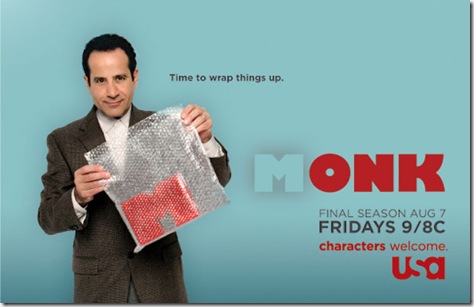
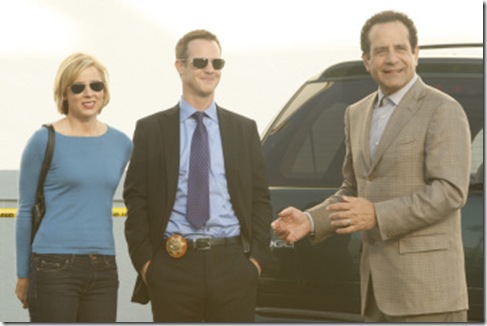
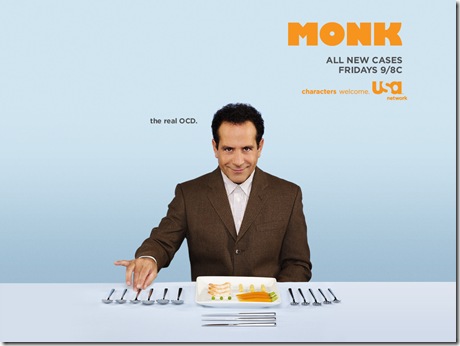
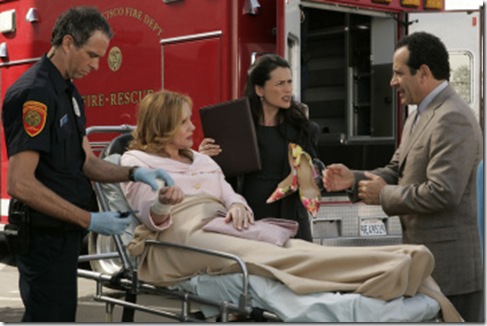
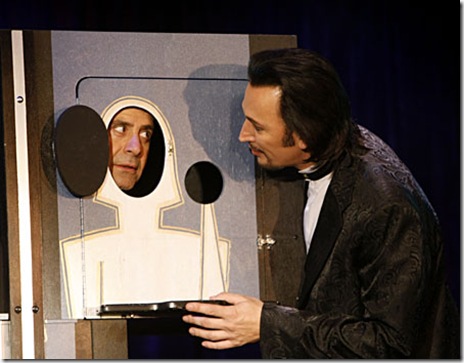
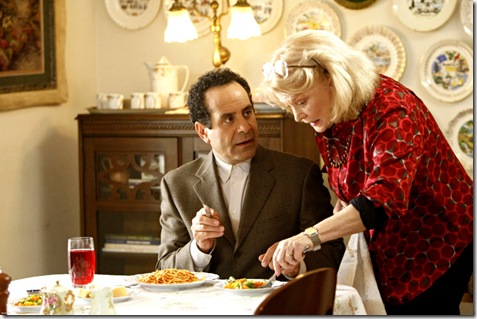
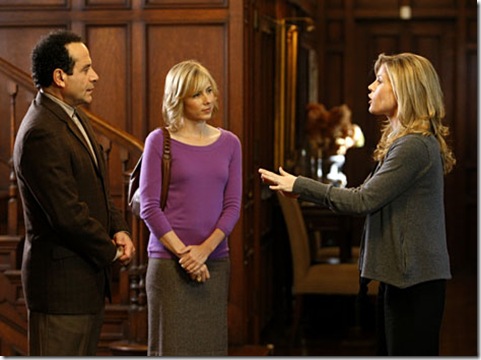
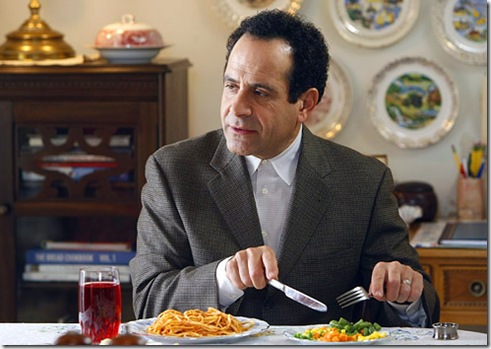
i've just started watching Monk on the weekend re-runs here, and i love it. he's so anal that it's funny, but he's smart. since i don't have cable, i guess it'll be a while before i know how the show finally ends up–whether he finds his wife's killer.